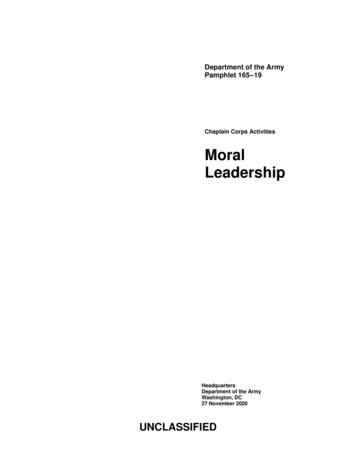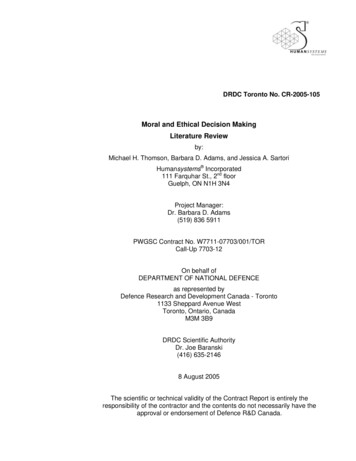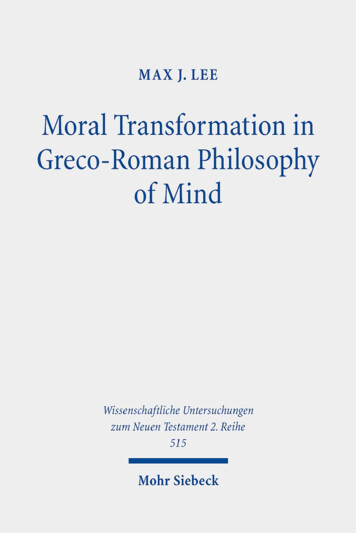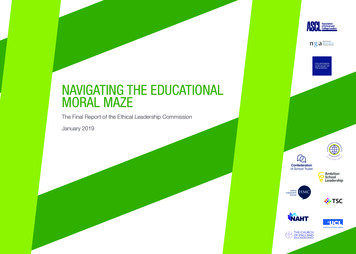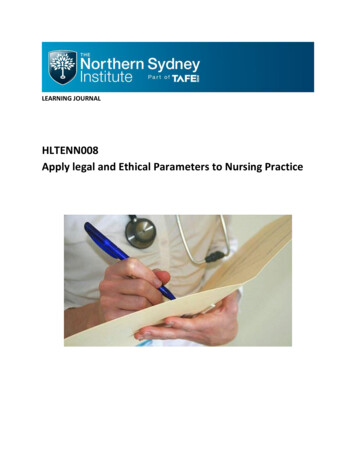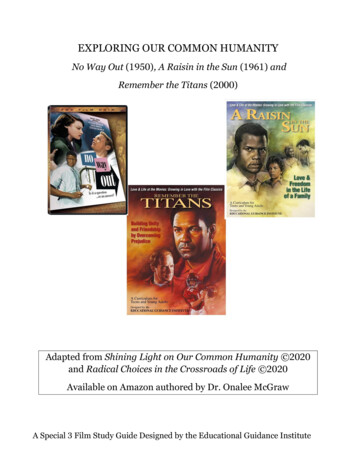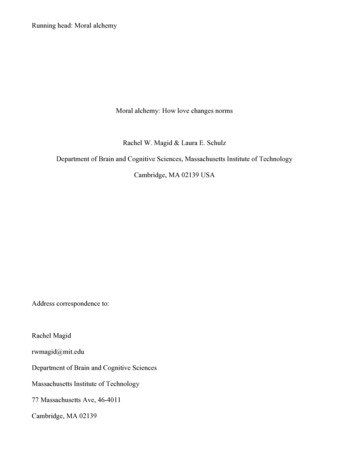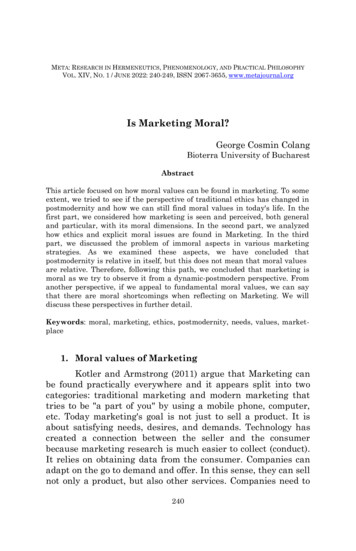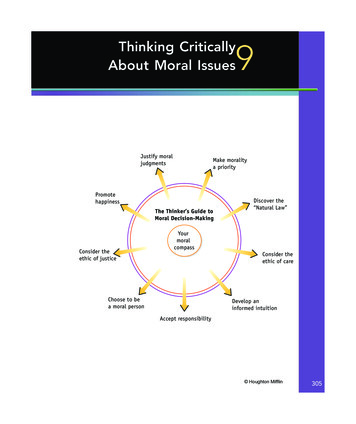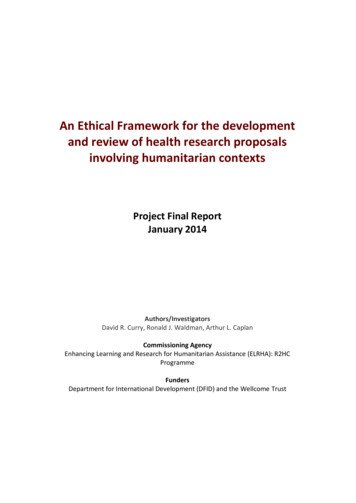
Transcription
Ethical and Moral Leadership in the MilitaryActivity Statement: View the movie Saving Private Ryan and discuss the importance ofmorals and ethics for military leaders.Affective Lesson Objective: Value the importance of morals and ethics for military leaders.Affective Samples of Behavior: Explain how an officer’s responsibilities establish their priorities formaking decisions.356 Defend why unlawful orders must be disobeyed. Defend the need to recognize and ignore illegal/immoral orders. Describe the ethical dilemmas imposed during war/conflict. Describe the ethical issues surrounding killing prisoners of war/enemies. Actively participate in classroom discussion regarding ethicalconsiderations in war.
ETHICS THEORY FOR THE MILITARYPROFESSIONALChaplain (Col) Samuel D. MaloneyTAdapted from Air University Review 32, no. 3 (March-April 1981)he United States is increasingly concerned with ethics. More professors areteaching courses in ethics and more students are studying ethics than ever before.Incidents in Vietnam and Washington have reminded us that people in all walksof life are vulnerable to doing what is wrong. Professional groups—lawyers, doctors,teachers, engineers, business managers, and others—are structuring codes of ethicsfor their members. Throughout the past decade, military professionals at the serviceacademies and educational centers have shown increasing interest in the study of ethicalprinciples. Most officer training schools now include at least an elective on professionalethics, in which officers are encouraged to construct codes of ethics for the military service.Perhaps we are realizing that right and wrong may differ from common practice, majorityopinion, or what the system will tolerate. Perhaps we as a nation are beginning to seethe fallacies in the ethical relativism of “doing your own thing.” We may even be ready toacknowledge the complexity of ethical decision making and move beyond the dominatingprinciple of personal or public happiness. Some of us are ready to assert that, in additionto such preeminent values as beneficence and justice, ethical behavior also involves pastcommitments, present relationships, and future hopes.This article will probe some of the complexities of acting ethically within the military system.I propose to direct your thinking in three ways: (1) to identify the fundamental pressuresthat are upon us all, that is, the ethical bases or theories to which we are responsive; (2)to highlight the importance of certain areas where ethical problems abound; and (3) toreaffirm some basic principles to guide us.THE COMPLEX ETHICAL PRESSURESThe complex ethical pressures upon the military professional are the rules, goals,and situations that provide the context and criteria for determining what is rightand wrong, good and bad. The moment of decision making or action taking for themilitary professional is crowded with signals emanating from rule-oriented obligations,goal oriented aspirations, and situation-oriented demands. Each individual is responsiblefor juggling the moral claims from these sources and for determining which signals meritpriority.Ethical and Moral Leadership in the Military 357
Rule-Oriented ObligationsRules most commonly provide the primary criteria for ethical judgments. The questions“What ought I to do?” and “What is right for me to do?” reflect not only a sense of obligationbut also an awareness that a standard exists for establishing what is obligatory and whatis right. Originally, these were religious questions referring to the will of God. They nowhave become questions for the citizen and military professional.Military personnel, more than most citizens, live under a sense of obligation, aligned witha strong base of order, obedience, and discipline. We have taken oaths admitting usinto the ranks of the military. As officers we affirmed a commissioning vow. We swore to“support and defend the Constitution of the United States.”As citizens we are also obligated to honor constitutional justice, civil law, and the socialand ethnic mores of our communities. The primary ethical pressures upon us, however,are such formal mandates as telling the truth, keeping promises, respecting property, andpreserving life. These constitutive or universal norms are the mortar without which socialinstitutions would crumble. While such norms need not be regarded as absolute moralrestrictions, the burden of proof is always upon those who would take exception to them.Rule-oriented living has a long history in Western religions. The orthodox Jew, by thebeginning of the Christian era, lived under an elaborate complex of conditioned andunconditional laws. The covenantal requirements of Mosaic Law consisted of 613injunctions, 365 “thou shalt not” prohibitions and 248 “thou shalt” obligations. Far fromburdensome, the Law clearly defined what God would have the believer do and not do; itprovided the moral framework for life.For the Christian, law has been redefined as living in an obedient relationship with Godthrough heeding the teachings of Jesus. The Sermon on the Mount, the ethical catechismof the early Church, and the Thomistic understanding of moral law have provided adeontological* interpretation of morality. The pressure upon the Christian is not to beconformed to this world but to be transformed in order to prove what is the good andacceptable and perfect will of God (Romans 12:2).*As relating to the ethics of duty or moral obligations.Today the followers of Islam are more rigidly fundamental than either Jews or Christiansin their understanding of morality as obedience to a set code or to religious leadership.Islam means “to submit,” and a Muslim is “one who has submitted.” The Koran, the recitedteachings of Muhammad, the Prophet of Islam defines the essential duties decreed byAllah and binds the believer to loyal subjection.The rule-oriented approach to ethical theory establishes in given standards the criteria fordetermining right and wrong. Dilemmas exist when two or more obligations conflict. Onemust sometimes choose between what one believes God commands and what the staterequires, between what a superior officer orders and what regulations prescribe, or betweenwhat law exacts and what personal conscience dictates. The philosopher Immanuel Kant358
is the premier exponent of a method for determining fundamental obligations. For Kantthe supreme principle of morality is good will, and “the first proposition of morality is thatto have moral worth an action must be done from duty,”1 irrespective of consequences.The subject maxim by which duty is determined is the categorical imperative, that which isbinding without exception. Two expressions of the categorical imperative are especiallymeaningful. The first is: “I should never act in such a way that I could not also will that mymaxim should be a universal law.”2 For example, should I submit false reports—whetherof body counts, flying hours, or materiel readiness—when I perceive my best interestlies in false reporting? No, for this maxim cannot be universalized without destroying themaxim by rendering all reporting invalid. A second valuable expression of the categoricalimperative is: “Act so that you treat humanity, whether in your own person or in thatof another, always as an end and never as a means only.”3 (We will return to this selfexplanatory binding rule later.) Kant did not discuss what one should do when categoricalimperatives conflict.Goal-Oriented AspirationsIn addition to citing rules, we determine which decisions and actions are ethical by referringto goals. The previous question was “What ought I to do?” The questions here are “Whatis good?” or “What goal should I seek?” The criteria for determining right and wrong areno longer historical standards but future consequences. The good decision or action ismeasured by its ability or promise to attain a desired goal. Aristotle defined the good allmen seek as happiness.4 Jeremy Bentham elaborated this happiness principle of ethicsas the principle of utility, “that principle which states the greatest happiness of all thosewhose interest is in question, as being the right, proper, and only right and proper anduniversally desirable, end of human action.”5 In the hands of John Stuart Mill, the greatesthappiness principle was enlarged to include the general good of all: “the happinesswhich forms the utilitarian standard of what is right in conduct, is not the agent’s ownhappiness, but that of all concerned.”6 Popularly stated, this goal is “the greatest good forthe greatest number.”For the military professional, goal-oriented aspirations are a combination of the publicgood and personal happiness. On the public side is an array of national goals andmilitary objectives. Our aim is to assure the security of the United States, defend againstaggression, and aid our allies. The more immediate objective is accomplishing themission. This may range from training personnel and maintaining weapon systems todelivering personnel and supplies, striking targets, or defeating enemy forces. On thepersonal side, we want job satisfaction, recognition, promotion, financial security, highOER/APR ratings, a happy home, and an overall sense of fulfillment in life.I have identified the ethical theories by which we judge right and wrong as pressuresbecause the signals we get from these theories are frequently in tension. Our goalsare often at odds with each other. Conflict between goals and rules, moreover, is alsocommon. This confusion in life may be likened to a football game. While ultimately thegoal is to score points, immediate choices have to be made among short-yardage plays,long-yardage plays, passing, running, kicking, field goal, or touchdown efforts. WhateverEthical and Moral Leadership in the Military 359
the decision, all actions are governed by set rules and called plays. If the ball is advancedbut the rules violated, the team can be penalized valuable yards. If the signals are ignored,a broken play and lost yardage may result. Sometimes when the quarterback sees thatthe play called in the huddle will not work, he resorts to calling an “audible;” that is, headjusts to an unexpected defensive alignment. The audible introduces us to a third typeof ethical judgment, the situation-oriented decision.Situation-Oriented DecisionIn the early 1960s a popular way of making moral decisions received new definition:situation ethics or the new morality. Both leading proponents, Joseph Fletcher and JohnA. T. Robinson, were churchmen. The significant questions they asked were “Whatis appropriate to the situation?” or “What is fitting?” In situation ethics the particularcircumstances of a situation provide the criteria for determining right and wrong. Here, eachsituation is unique, without precedent. Judgments must be relative to the circumstances;the circumstances determine what actions should be taken. Without the binding andunexceptionable absolute of love, situation ethics would have mirrored the permissivesociety in which it emerged. Of rule-oriented judgments, Fletcher said, “Situation ethicskeeps principles sternly in their place, in their role of advisers without veto power.”7A major limitation of situation ethics is its focus on the unusual, once-in-a-lifetimecircumstance. It is not geared to day-by-day living; it provides no game plan. Thesituations in which we must make ethical decisions, after all, have a sameness aboutthem to which rules or goals do apply. Any realistic person knows that under certainconditions we must act situationally. When shot down behind enemy lines, we know wewill lie or steal to survive and return to friendly forces. This admission, however, does notmean that ethical theory should tolerate lying or stealing or should make easy my evasionof the formal mandates on which civilization is structured. While none would fault theimportance situationists place on acting in a loving manner, love is a motive, an attitude;love is not a program with content. Situation ethics resists systematization; it can neverbe normative. Without appropriate checks and balances, situation ethics could lead toethical anarchy. Military professionals do occasionally find themselves in circumstanceswhere regulations and mission objectives fail to provide sufficient guidelines. In thoserare instances the aptitude for innovative leadership can be a virtue.When followed inflexibly, any of the three approaches to understanding the bases for ourethical judgments can result in moral aberration: exclusive attention to rules can resultin legalism; rigid adherence to Mill’s utilitarian goal of the greatest good for the greatestnumber can promote a tyranny of the majority; and preeminent attention to situations canresult in loss of directives and moral chaos.360
THE PREDOMINANT ETHICAL PROBLEMSStudying ethics theories without relating them to the predominant ethical problemsof military professionals would be merely an intellectual exercise. These theoriesare tools to help us think more clearly about our decisions and actions. Threeoverlapping areas in which our theories may be applied to problems are people, integrity,and career.PeopleHuman needs are a military commander’s prevailing problem. I asked a newly appointedgroup commander what he considered the hardest part of his responsibility. Withouthesitation he replied, “Making people decisions is the most difficult part of being acommander.” He was rapidly discovering the complexities of leading people. Peoplehave needs, they have frailties, and they have great potential. People need consideration,recognition, stroking, and encouragement.In 1976 as a group project, students of the Air Command and Staff College preparedGuidelines for Command: A Handbook on the Management of People for Air ForceCommanders and Supervisors. Chapter 2 is entitled “Solving Problems InvolvingPeople.” This chapter lists 57 entries on problem situations from AWOL to weight control.It makes no mention of such human problems as abortion, incest, homosexuality, sexualdeviance, gambling, marital problems, moral problems, religious problems—the kindsof problems chaplains confront on a regular basis. These are problems people havewhich a commander cannot ignore. A recurring complaint included in the 1970 Army WarCollege’s Study on Military Professionalism is this: “Across the board the Officer Corps islacking in their responsibility of looking out for the welfare of subordinates.”Being a commander is working with people. The military is people. America is people.The military exists to serve the people of America. However it may have been understoodin the past, military leadership is now measured by management and motivational skills.Leadership is more than giving orders; anyone can give orders. The skilled leader knowshow to motivate the people on whom he depends to accomplish the mission. People arethe focus of every command and the heart of every mission.IntegrityThe second major ethical concern for military professionals is probably integrity. I askedthe commander of the North Carolina Air National Guard what he considered to be thegreatest ethical problem in the Air Force; he answered: “Integrity, especially in reporting.”The Army War College’s Study on Military Professionalism (1970) supports this perception.Integrity is a major concern of that study. Typical of the remarks from questionnaires werethese:Ethical and Moral Leadership in the Military 361
CPT: reluctance of middle officers to render reports reflecting the truemateriel readiness of their unit. Because they and their raters hold theirleadership positions for such short periods, they feel that even one poorreport will reflect harshly upon their abilities.MAJ: I am concerned with honesty—trust—and administrative competencewithin the Officer Corps. Commander influence impairs calling a “spadea spade.”MAJ: The system forces unethical reporting and practices and punishesvariation.This last remark is especially significant, for it places the blame on the system. Thesystem does create pressure, and it is certainly not errorless. Integrity, however, is ahuman concern; people operate, perpetuate, and validate any system. Responsibilityfor moral integrity cannot be shifted. Some systems may make honesty more difficultthan others, but the system only reveals what an individual’s values really are. Ethicallyalert military personnel will always be disturbed by the variances between the idealstandards proclaimed by the services and the actual practices that overtly deviate fromthose standards. At a meeting of the Inter-University Seminar on Armed Forces andSociety meeting at Maxwell Air Force Base in October 1976, a graduate of the Air ForceAcademy voiced his great disillusionment after only four months at his first assignment.The discrepancies between the ideals espoused by the USAF Academy and the operativestandards of an Air Force base were leading him to consider resigning his commission.CareerIntegrally related to the problem of integrity is the problem of placing career before honor.The military professional should be concerned about his or her career. Achievementranks high in the officer’s code of values. A fine line, however, separates valid concernof one’s success in the military from excessive, unhealthy careerism. Crossing thisfine line is a problem not unique to the military. John Dean’s Blind Ambition and JohnEhrlichman’s Washington Behind Closed Doors confirm the prevalence of excessivecareerism. Whatever the profession, personal ambition can cloud ethical judgment andmake fools of us all. In the military, preoccupation with career can lead us to be yesmen for the commander instead of constructive critics. It can lead us to cover up for thecommander. It can lead us to keep unwelcome reports from him. It can lead us to coverfor ourselves in our effort to look good at all costs. It can lead us to do what we know ismorally wrong. As one officer in the Study on Military Professionalism observed: “It takesa great deal of personal courage to say ‘the screw-up occurred here’ rather than passingthe blame to the lower level.”362
The September 1977 issue of Human Behavior magazine reported the results of asurvey of 173 American generals conducted by Brig Gen Douglas Kinnard (U.S. Army,retired). All the generals had served in Vietnam between 1965 and 1972. This article wassummarized by the Washington Post and reprinted in local newspapers. The summaryreads:Kinnard found an uneasiness among generals over handling of the war.More than half, for example, felt search and destroy missions at the centerof the American strategy should have been better executed. Asked whygenerals had not spoken out during the war, Kinnard, now a political scienceprofessor at the University of Vermont, said, “The only thing I can think of iscareerism.”8Gen George C. Marshall once observed that decisions requiring moral courage are muchharder to make than decisions pertaining to physical courage. The reason? “This iswhen you lay your career, perhaps your commission on the line.” Establishing prioritiesbetween goal-oriented career aspirations and rule-oriented obligations may be the mostdifficult moral choices officers face.THE ABIDING ETHICAL PRINCIPLESMilitary professionals can never stray from the time honored principles of “Duty,Honor, Country” and remain true to their calling. The three ethic theoriesoutlined—rule-oriented obligations, goal-oriented aspirations, and situationoriented decisions—are useful in the service of “Duty, Honor, Country.” These theoriestogether with the three abiding principles can be applied to the difficult problems suggestedunder the subtopics of people, integrity, and career.Duty: Conduct and Person-Oriented LeadershipThe military services are just that—services. They exist to defend and support humanvalues. The key personnel in the military for promoting these services are the militaryprofessionals. The duty of the military professional is to conduct person-orientedleadership, leadership consistent with the fundamental commitments of this nation.Most military professionals are aware that those they seek to lead are people first andsoldiers, sailors, or airmen second. They have entered the military with unique personalitiesand individual sets of motivations, interests, attitudes, and values. They share basicneeds for survival, belonging, esteem, and self-realization. Each of these needs must bemet in turn for the next to become operative. Although servicemen wear uniforms, theyalso participate in an intricate network of civilian relationships. They have wives, children,husbands, parents, hopes, fears, dreams, religious ideals, and names. The successfulleader remembers that he or she is dealing with whole beings, people who are infinitelymore than mechanics, clerks, typists, technicians, artillerymen, or pilots.Ethical and Moral Leadership in the Military 363
In our desire to achieve our military missions successfully, we are sometimes tempted todepersonalize those with whom we work along with those against whom we fight. Thelatter attitude is especially prevalent. We reduce the enemy to objects; we take awaytheir names and nationalities and call them “Huns” or “Gooks” or simply “little yellowbastards.” We try to protect our own self-image by pretending that the enemy we are killingis less than a human being with a name and with a family. Similarly but more subtly, wedepersonalize our associates in the military when we treat them as hands or troops whoare there to do our bidding or to advance our careers. Person-oriented leaders respectthe personhood of each individual in the command, they establish I-Thou rather than I-Itrelationships. Kant’s dictum applies: people are ends in themselves, never means. Thereal obscenity in the world is objectifying people, treating them as things rather than aspersons. I like the counsel of a staff officer associate. He advised me as follows: “I havenever gone wrong by treating those under me as people and respecting them as such.”Honor: Exemplify Moral IntegrityAny code of ethics devised for military professionals undoubtedly will contain articles thatemphasize the importance of professional and personal integrity and that recognize theprofessional officer’s responsibility to be an example of integrity for subordinates. Thecurrent chief of Army chaplains, writing for Parameters some years ago, reported on astudy of ethics among businessmen conducted by Harvard Business Review. The studyrevealed a double-edged situation: some businessmen felt pressured to compromisetheir integrity in order to please their superiors, others felt pressured by bosses whoexpected integrity. The study concluded: “If you want to act ethically, find an ethicalboss.”9 The lesson for the military is: If you want integrity to prevail in the military, actethically yourself and expect ethical actions from your subordinates.Integrity, like person-oriented leadership, is a whole-person concept. A former chief of AirForce chaplains reminds us:Integrity is not just truth telling, or kindness, or justice, or reliability. Integrity is the state ofmy whole life, the total quality of my character, and it is witnessed by the moral soundnessof my response in every life situation.10Integrity is not something that can be turned on and off. It reflects the value systems inwhich our lives are grounded. The recent series of articles on integrity in TIG Brief haspurposefully sought to generate discussion and thought about integrity throughout themilitary. The remarks by Gen Bryce Poe II, commander, Air Force Logistics Command,merit particular attention. He said:We must remember the complete meaning of “integrity,” not just honesty but also sincerityand candor. Our code of behavior must not tolerate shallowness, expediency, or deception.This rigidity and uncompromising adherence to standards does not in the least meanthat we must be self-righteous or lack compassion. On the contrary, individuals whorecognize that people make mistakes, even when they are doing their level-best, not onlydisplay integrity they reinforce that of their subordinates.364
In the last analysis, integrity is an entirely personal thing. Important to anyone, it isabsolutely vital to the military professional who has responsibility for human life and publicproperty. As General Douglas Macarthur once said, our code “embraces the highestmoral laws and will stand the test of any ethics or philosophies ever promulgated for theuplift of mankind. Its requirements are for the things that are right, and its restraints arefrom the things that are wrong.” Whether we label that code, “Duty, Honor, Country,” orsimply, “Integrity”—the requirement is the same.11Few officers have tried so vigorously to inculcate an appreciation of integrity among thosefor whom they had responsibility as Adm James B. Stockdale. While president of theNaval War College, he inaugurated a course on the “Foundations of Moral Obligation.”His course was built on principles that became profoundly meaningful for him during2,714 days of imprisonment and torture in Hanoi’s Hoax Lo prison. He claims that hewas sustained as a prisoner of war (POW) more from what he had learned in philosophythan from what he had read in survival manuals. He knew that man needs more thanbuzzwords and acronyms; he needs the enduring principles articulated by mankind’smost thoughtful spirits. His students read from Job, Epictetus, Plato, Aristotle, Kant, Mill,Emerson, Dostoevski, and the existentialists. He said:I think this is the only way to teach a sophisticated audience “duty, honor, country.” I’mnot trying to make fundamentalists out of them. I’m not trying to make warmongers out ofthem. I’m trying to make more self-confident leaders who will realize half of what comesinto their baskets is crap and that they should worry about things that are important.12Admiral Stockdale would have us regain our moral bearings and rediscover the powerand the courage available when we have committed ourselves to fundamental integrity.Country: Initiate Moral Concern in AmericaThe moral quakes of Hiroshima, My Lai, and Watergate have fractured the confidence ofmany in America’s current commitment to honor, integrity, and high humanitarian ideals.Those events have changed the way Americans think about themselves: they haveproduced a tidal wave of moral uncertainty, self-doubt, alienation, and rebellion. Justas thinking well of self is vital for personal mental health, so apparently must a nationhave a good self-image for its corporate well-being. One of the great national tasks forthe 1980s, therefore, is the recapturing of a spirit of moral integrity in America. Militaryprofessionals with their avowed commitments and goals occupy a favorable position inthe United States. They can lead the way. They can become the catalysts who initiatethroughout society a reawakening of integrity and moral awareness.Through philosophy and ethics, is it possible for the military—and through the militaryfor the nation—to regain its moral concern and its concomitant moral self-confidence?Wilson Carey McWilliams has projected this possibility. In Military Honor After My Lai, hetentatively conjectures that “perhaps the Army may, in its own interest, help free civilianAmerica to rediscover its own honor.”13 He implies that the Army can first find its ownmoral compass. McWilliams and Sir Thomas More have similar hopes. Long before heEthical and Moral Leadership in the Military 365
was made Henry VIII’s Lord Chancellor, More debated whether moral philosophy had anyplace “in the council of princes.” His conclusion was yes, but only subtly and obliquely.“You must strive,” he wrote, “to guide policy indirectly, so that you make the best of things,and what you cannot turn to good, you can at least make less bad. For it is impossible todo all things well unless all men are good, and this I do not expect to see for a long time.”14The wisdom of More has supplied a necessary clue to the reality of the human situation.Military professionals can pioneer a return to fundamental integrity, though not by boldfrontal attacks. They must start with themselves as individuals who, like Thomas More,commit themselves to first principles and to selfless goals. They must be courageouspeople who place “Duty, Honor, Country” ahead of careers, people who say the coverups stop here. The exploitation and objectifying of people can stop if leaders in sensitivepositions consistently treat people as ends, never as means to ends; consistently perceiveenemies, peers, subordinates, and superiors as persons of great value. Dishonesty,misrepresentation, and false reporting can only be reversed if key professionals insiston honor and exemplify integrity. Selfish careerism that exalts personal advantageabove the well-being of others and of the whole can only be reduced if commanders stoprewarding self-aggrandizement and become models themselves of responsible service.Reshaping the moral climate within the military and the nation needs only a few dedicatedprofessionals to make a beginning. Then, beyond the level of individual example, mustcome unit example—a squadron, a company, a battalion, a group, a base, a post, adivision, a major command, a service. To that noble end studies of ethics in the militaryare committed.Chaplain (Col) Samuel D. Maloney, North Carolina Air National Guard,earned his ThM and ThD degrees from the Union Theological Seminary.During World War II, he was an aircraft commander in the Pacific theater.He has lectured at National War College, Air Command and Staff College,Command and General Staff College, and the Professional Military EducationCenter, and has published numerous articles in the Tar Heel Times.Notes1. Immanuel Kant, Foundations of the Metaphysics of Morals, trans. Lewis W. Beck(Indianapolis: Bobbs-Merrill, 1959), 16.2
360 the decision, all actions are governed by set rules and called plays. If the ball is advanced but the rules violated, the team can be penalized valuable yards.
